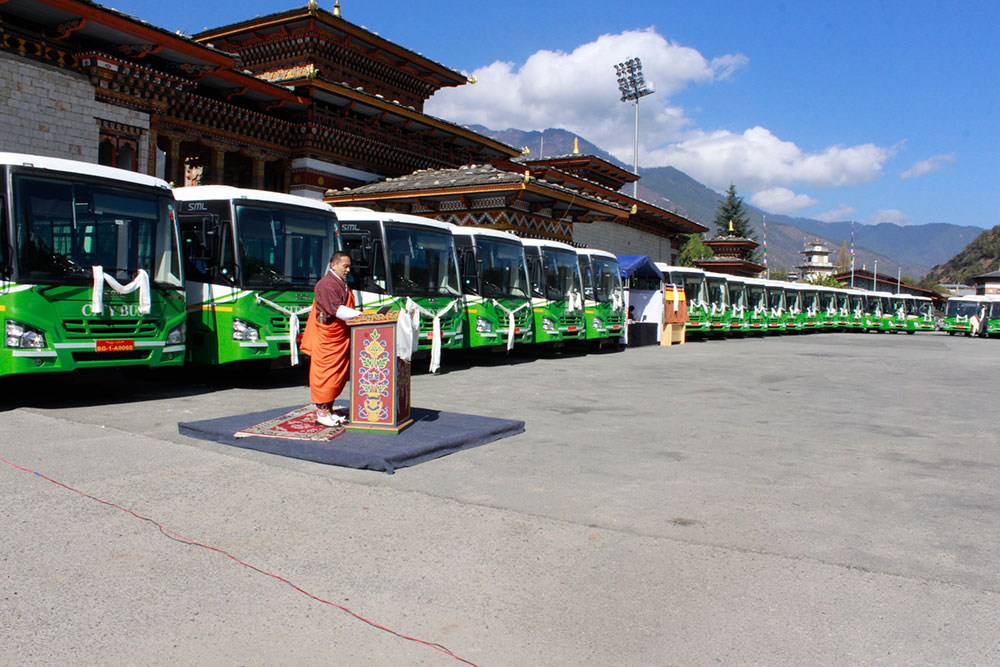27 new buses to hit the city roads
Yangyel Lhaden
In a grand ceremony that included free bus rides, the City Bus Services (CBS) of the Thimphu Thromde yesterday launched 27 new city buses equipped with a global positioning system and facilities like smart card readers, connected with the Gakyid Ride application to improve reliability and efficiency of urban public transport.
Starting today, the buses will use new bus routes and bus stops identified by the thromde’s geographic information system (GIS). A bus will arrive at a stop in the trunk or main route from Babesa to Dechencholing within 10 minutes.
However, there is more work to be done for smooth operations. Infrastructures such as bus stops (shelter, bay, signage), terminals, and site development are not yet in place, according to the GIS study for CBS.
According to a GIS study, 168 bus stops and a terminal in North and South Thimphu are identified. Without a bus terminal, the new city buses are temporarily parked in the thromde’s garage in Babesa.
GIS officer with Thimphu Thromde, Sonam Zangmo, said that a budget of Nu 7 million (M) was allocated for the CBS, from which about Nu 3M would be used to construct eight bus shelters, and the remaining budget has been allocated to construct bus terminals and site developments.
She said that in the next fiscal year, they will propose an additional budget to construct infrastructures needed for the CBS. “It will take two years to construct all the infrastructures, depending on the budget.”

The new buses have smart card and GPS coordinated audio systems to notify passengers
The new city buses are friendly for persons with disabilities, with ramps and audio notifications notifying passengers about the arrival of buses to the stops. However, even though the buses have ramps at the bus stops, the ramps do not touch the ground to help passengers with disabilities.
Pema Dorji, a passenger who uses a wheelchair, said that he was happy with the ramp facility in buses, but he would still need help to board the bus. “There is the chance that I will fall down.”
Sonam Zangmo said that site developments and construction of infrastructures will be carried out according to priority. “We have to use the limited budget prudently, considering all the provisions without compromising on quality.”
City bus operation
Including the new buses, there are 68 buses with the CBS. Starting today, 44 city buses will ply the road.
In the first phase, buses will ply in five of the 10 subsidiary routes: Royal Thimphu College, Chamgang, Hongtsho, Debsi, Motithang, and Yangchenphug Higher Secondary School.
Subsidiary routes are for places that are not covered by the main route. At each bus stop, audio notifications in Dzongkha will notify the passengers of the location.
To revive the traditional local names of places, bus stops in the city are named accordingly. For example, bus stop names in Babesa read as Tshalu Barp, Barp Lhakhang, and Tshalu Murphey. The bus will stop at every bus stop for a minute.
CBS’s Manager, Sangay Dorji, said that there was no policy to provide a priority lane for public transport in the country, which will hamper our target to ensure a bus reaches a stop every 10 minutes. “ Support from the Road Safety and Transport Authority and traffic officials are important to ensure buses do not get stuck in traffic jams and reach a bus stop every 10 minutes.”
Sangay Dorji said that new buses were not equipped with stop bells to disembark because passengers are not used to it, while in the past some have misused or destroyed them. “We will start that in the future.”
Sangay Dorji said that not all city buses were able to ply because 20 new drivers are still undergoing training in training institutes.
He said that new drivers will complete training next year and the CBS is planning to extend city bus timing until 10:00PM when new drivers arrive.


